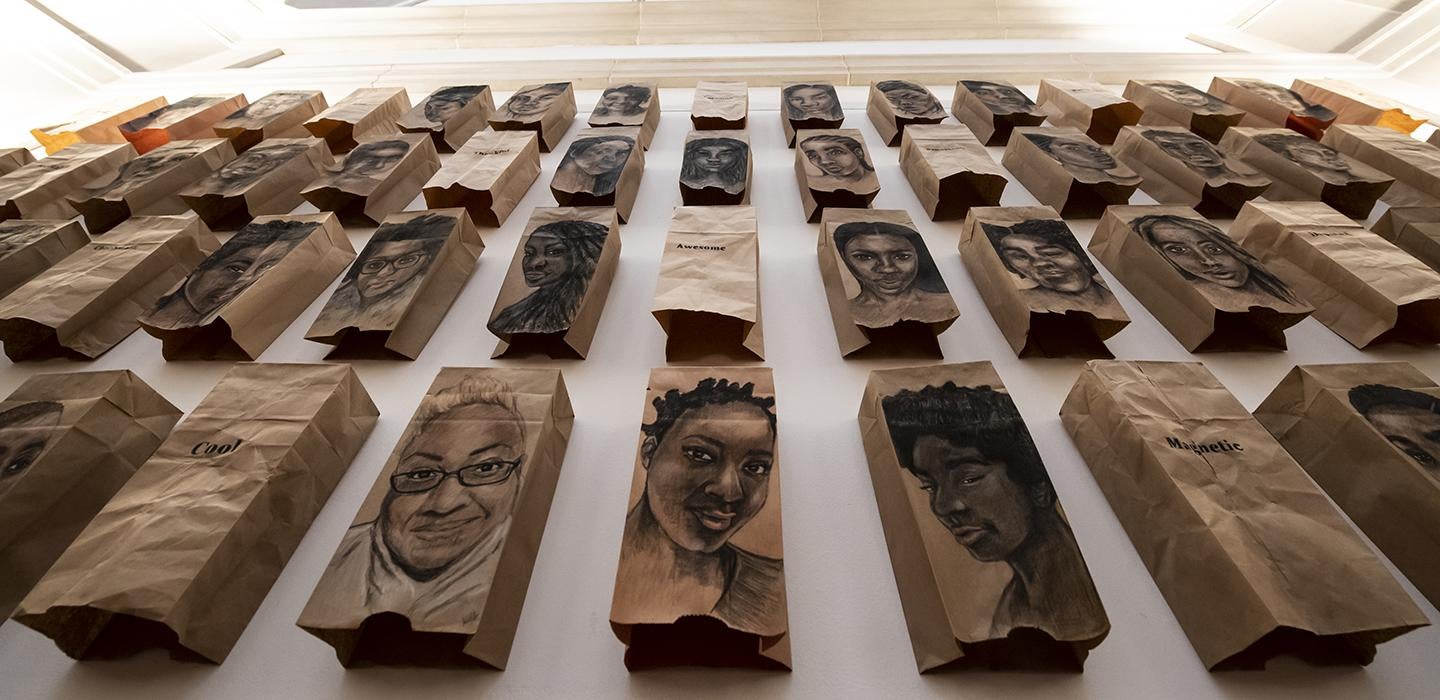
Subscribe to Pittwire Today
Get the most interesting and important stories from the University of Pittsburgh.In Ashley Jones’ “More Than Just a Paper Bag,” the soulful eyes of 216 women fix themselves on exhibit goers. The work’s charcoal and chalk portraits push viewers to confront colorism and the problematic history of the “Brown Paper Bag Test” — a measure used to deny privileges to people with skin darker than a common paper bag.
Jones’ piece is one of more than 50 quilts, photographs, paintings, mixed media pieces and more in the “Women of Visions: Celebrating 40 Years” exhibit housed in the University of Pittsburgh’s Henry Clay Frick Fine Arts Building.
The exhibit is a collaborative effort between Women of Visions (WOV), a collective of Black female artists in Pittsburgh founded in 1981, and the University. Through the artwork, visitors discover the joy, resilience and heartache of Black women.
"There is consistency in the versatility, strength and beauty Black women bring as human beings in this country, and Women of Visions is a microcosmic view of that," said Christine Bethea, the current WOV president. "We've survived so much in our 40 years in a city with a poor reputation for Black people. Through the contradictions of who and what Pittsburgh is, WOV has been consistent, welcoming and gracious, and this exhibit — our work — lets women of color know there's always hope."
WOV is the University Art Gallery’s (UAG) longest-running Black women’s exhibit and possibly the longest-running collective of Black women visual artists in the nation. The group claims Selma Burke, the internationally acclaimed sculptor whose bas-relief portrait of President Franklin D. Roosevelt likely inspired the profile found on the U.S. dime, as an early mentor.
To create the exhibit, Pitt students interviewed the artists, interpreted exhibition works, finalized installation and completed research for a 40th-anniversary publication, which launches Feb. 17.
"Hands-on curatorial projects are essential to our museum studies program," said Alex J. Taylor, an assistant professor and academic curator in the Department of History of Art and Architecture in the Kenneth P. Dietrich School of Arts and Sciences. "But this was the first time we worked with a group of local contemporary artists for such a project."
Taylor and Bethea partnered with UAG Director Sylvia Rhor Samaniego, former executive director of the local gallery Contemporary Craft and visiting instructor Janet McCall and Amanda Dibando Awanjo, a doctoral candidate in English, as well as 40 students in Pitt’s Curatorial Development and Exhibition Presentation courses, taught by Taylor and McCall in spring and fall 2021, respectively.




"We very rarely deal with living artists and a collective as important as WOV," said Rhor. "This was the first time we did such a collaborative experience, and the opportunity was transformative for our program, our students and us." She envisions UAG becoming a platform that uplifts women, minority and LGBTQ artists and said this exhibit is a step in that direction.
"It's the best show we've done in that regard," said Rhor.
The process was also transformative for WOV.
"The women found the experience very enriching," said Bethea. "It helped them understand the importance of what we're doing."
Some artists addressed racial and equity issues with works about police brutality and the #MeToo movement. "But we also wanted the exhibition to be a celebration of Black achievement," said Taylor.
Indeed, some artwork pays homage to the regality of ancient elders across the African diaspora; some celebrate ancestors from the Motown era. One display is a nod to the Pittsburgh Courier, a leading Black newspaper of its time.
"While we're honoring our past, there's still important work to do," said Bethea.
Taylor agrees. "Temporary exhibitions amplify the voices of local Black women," said Taylor. "But longer-term, Pitt must build collections that preserve a more diverse artistic legacy [we can] engage with in the future."
WOV accepts the challenge.
"Pittsburgh is a bastion for us to hold down the fort and where a lot of good can happen," said Bethea.
The exhibit will run until Feb. 25, Tuesday through Friday from noon to 4 p.m. and Thursdays until 7 p.m. Group appointments and special appointments can be made by emailing uag [at] pitt.edu.
— Kara Henderson


